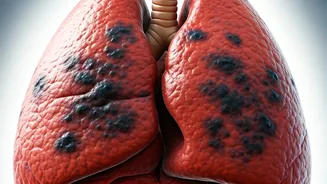Processed Meats and Lungs
Processed meats frequently contain nitrites and nitrates, additives used to preserve them and give them their color. When these substances enter the body,
they can produce compounds linked to inflammation within the lungs. This inflammation has the potential to narrow airways and complicate breathing, which can be particularly challenging for individuals with existing respiratory conditions like asthma or COPD. Therefore, minimizing the intake of processed meats such as bacon, sausage, and deli meats can be a positive step for lung health. Opting for fresh, unprocessed alternatives whenever possible can help mitigate these potential risks. This proactive approach supports both respiratory health and overall well-being.
Sugary Drinks and Airways
Sugary drinks are linked to increased inflammation throughout the body, including the lungs. Regular consumption of sodas, sweetened juices, and other sugary beverages can cause chronic inflammation, which has the potential to affect lung function. Furthermore, excessive sugar intake may contribute to weight gain, and obesity can place added strain on the respiratory system. It can also reduce lung capacity and worsen symptoms for individuals with respiratory conditions. By decreasing the intake of sugary drinks and opting for water, herbal teas, or unsweetened beverages, one can support lung health and reduce the risk of respiratory problems associated with excessive sugar consumption.
Refined Carbs: The Effects
Refined carbohydrates, like white bread, pastries, and white rice, have a significant impact on lung health. These foods are quickly broken down into sugar, causing a rapid spike in blood sugar levels. This effect can lead to increased inflammation, which in turn can narrow the airways and make breathing difficult. High-sugar and high-carbohydrate diets are also linked to weight gain, another factor that can compromise lung function. Switching to whole grains, which are digested more slowly and offer more nutrients, can provide the body with essential components without overwhelming the lungs. This adjustment can help reduce inflammation and support overall respiratory health.
Fried Foods and Breathing
Fried foods often contain high levels of unhealthy fats, which can promote inflammation. When consumed frequently, these fats can contribute to systemic inflammation, including within the lungs. This type of inflammation might cause the airways to become constricted, potentially leading to respiratory difficulties. In addition, many fried foods are prepared using oils that, when heated, can release harmful compounds. For optimal lung health, it's beneficial to limit the intake of fried foods and opt for healthier cooking methods, such as baking, grilling, or steaming. These options help avoid the negative impacts associated with the excessive consumption of fried foods.
Dairy Products and Mucus
Certain dairy products can increase mucus production in some people. While this effect does not happen to everyone, for those prone to excess mucus, dairy can exacerbate respiratory symptoms. This excess mucus may thicken and block the airways, making breathing more challenging. Individuals with asthma or other respiratory conditions might find that reducing dairy intake helps to alleviate their symptoms. It's often recommended to monitor how your body reacts to dairy and consider alternatives like almond or soy milk if necessary. Tailoring dietary choices to suit individual responses to dairy can improve both comfort and lung function.
Excessive Salt Intake
High sodium intake is linked to fluid retention, which can be problematic for lung health. Excessive fluid can build up in the lungs, making breathing more difficult. This is particularly concerning for individuals with conditions like heart failure, which can lead to fluid accumulation. Consuming a diet that is high in sodium also increases the risk of high blood pressure, placing additional strain on the respiratory system. To promote better lung function, it's advisable to limit the intake of salty snacks and processed foods that are often high in sodium. Instead, choose fresh foods and season meals with herbs and spices rather than relying heavily on salt.
Artificial Sweeteners and Inflammation
Artificial sweeteners, often found in diet sodas, sugar-free candies, and processed foods, can sometimes trigger inflammatory responses. While research is ongoing, some studies suggest that artificial sweeteners can negatively affect gut health, which has indirect effects on lung health. A compromised gut can influence systemic inflammation, which in turn might impact the respiratory system. It’s important to acknowledge that individual responses vary, and it is crucial to pay attention to your body's reactions. If you experience respiratory symptoms after consuming foods with artificial sweeteners, limiting or avoiding them might be beneficial. This approach supports respiratory health and overall well-being.





















